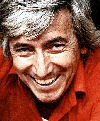On May 3 every year, International PEN joins writer colleagues and activists around the world in celebrating World Press Freedom Day.
(WiPC/IFEX) – On May 3rd every year, International PEN joins writer colleagues and activists around the world in celebrating World Press Freedom Day. We take this opportunity to recognize the principles of press freedom, which are underwritten by the undeniable human right of freedom of expression.
But also on this day, we pause to honor writers and journalists who have lost their lives in the line of duty. This year we are reflecting on the long, shameful tradition of impunity, in many countries worldwide, whereby those who have killed writers and journalists are never brought to justice.
This year marks the 50th anniversary of the Writers in Prison Committee of International PEN. In the past fifty years, hundreds if not thousands of journalists have been murdered or have disappeared. Often there have been no prosecutions, no trials, no sentences. This means that hundreds of killers, their accomplices, and the true authors of these crimes remain free, existing within a climate of impunity.
In 2009, 79 journalists were killed, including 33 in one appalling incident in the Philippines. Others were killed in countries as diverse as Somalia, Iraq, Mexico and Pakistan.
This year the Committee to Protect Journalists reports 24 killings of journalists working in the print and broadcast media this year alone. Again the deaths happen across the globe. Among the most dangerous countries is Mexico, where PEN has had long standing concerns, issuing protests at each killing, the most recent being in April.
International PEN calls upon governments everywhere to exert pressure where necessary to bring the killers of journalists to justice and to ensure an absolute end to this environment of impunity.
Today we mark World Press Freedom Day by remembering four journalists, from among the 50 emblematic cases representing the WiPC’s work over its 50 year existence, who have been killed because they fearlessly spoke their minds.
Georgi Markov was born in Bulgaria in 1929. In 1962 he defected to the West, where he later became a broadcaster for Radio Free Europe, frequently criticizing the Bulgarian regime. In 1972 a Bulgarian court sentenced him in absentia to six years in imprisonment for his defection to the West. In 1978 a member of the Bulgarian intelligence service fatally poisoned Markov by firing a ricin pellet from an umbrella into his leg as he waited at a bus stop on Waterloo Bridge in Central London.
Tahar Djaout was born in Algeria in 1954. Djaout graduated in 1976 and went on to work as a journalist for the French language newspaper Algerie-Actualite. While working as a reporter, between 1981 and 1991 he published four novels which criticised despotism and called for respect for human rights. In January 1993 Djaout co-founded the weekly newspaper Ruptures. Later that year, on 26 May, he was shot three times on his way to work in his car, and he died several days later. His death was attributed to ‘Islamic fundamentalists’.
Anna Politkovskaya was born in the USA in 1958, and graduated from Moscow State University in 1980. She worked for Russian newspapers from 1982 until 1999, when she became a columnist for Novaya Gazeta, one of the few independent newspapers in Russia which is known for its critical reports on politics and human rights. Despite numerous death threats and assassination attempts, Politkovskaya continued to expose human rights abuses in Russia and criticize President Putin, until she was killed in October 2006. She was shot in the head in what was clearly a contract killing.
Hrant Dink was born in 1954 in Turkey, to an Armenian family. In 1996 he helped found the weekly newspaper Agos, which focused its coverage on human rights abuses, minority rights and Turkish-Armenian relations. From its inception, the magazine and its staff suffered death threats from extremist nationalist groups. Despite receiving numerous death threats – threats that the Turkish police reportedly refused to take seriously – Dink continued to live a public life until his death, in January 2007 when he was shot dead while walking to the offices of Agos.
The suspected killers of Politkovskaya, the murderer of Hrant Dink, and those who ordered Dink’s killing are currently facing court proceedings. Yet there has been no justice for Markov, killed over 30 years ago, nor for Djaout, killed 17 years ago.
This is true for the vast majority of journalists killed for their writing.



